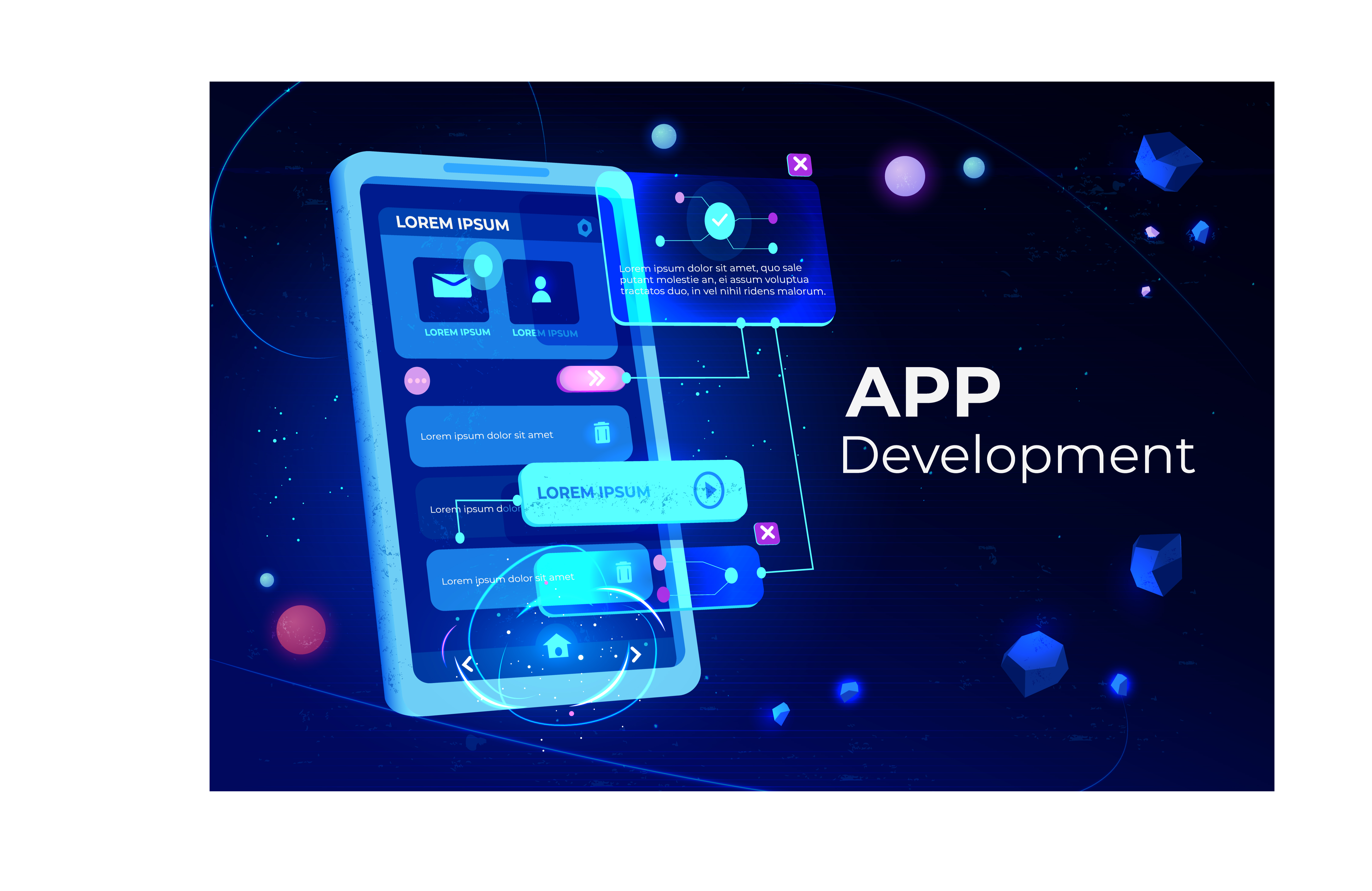


Artificial Intelligence (AI) has become an integral part of numerous industries, revolutionizing traditional processes and enabling innovative solutions. In the realm of mobile app development, AI's influence is profound, reshaping how apps are built, deployed, and experienced by users.
Artificial Intelligence, often abbreviated as AI, refers to the simulation of human intelligence processes by machines, primarily computer systems. These processes include learning (the acquisition of information and rules for using it), reasoning (using rules to reach approximate or definite conclusions), and self-correction.
Mobile app development encompasses the process of creating software applications that run on mobile devices, such as smartphones and tablets. It involves a combination of software development, design, testing, and deployment to deliver functional and user-friendly applications tailored to the needs of mobile users.
The integration of AI technologies into mobile app development brings forth a plethora of benefits, including enhanced user experiences, streamlined development processes, and innovative features that were previously unimaginable. As the demand for smarter, more intuitive mobile applications continues to grow, AI presents itself as a key enabler for meeting these evolving expectations.
Voice Recognition
Voice recognition technology enables mobile apps to interpret and understand human speech, allowing users to interact with applications using natural language commands. Through sophisticated algorithms, these apps can accurately transcribe spoken words into text and execute corresponding actions, ranging from simple tasks like setting reminders to complex queries like conducting web searches.
Chatbots and Virtual Assistants
Chatbots and virtual assistants leverage NLP capabilities to engage in conversations with users, offering assistance, answering queries, and providing relevant information in real-time. These AI-driven interfaces simulate human-like interactions, enhancing user engagement and efficiency within mobile apps across various domains, including customer service, e-commerce, and productivity tools.
Personalized Recommendations
Machine learning algorithms analyze user behavior and preferences to deliver personalized recommendations, such as product suggestions, content recommendations, or activity reminders. By continuously learning from user interactions and feedback, these algorithms optimize recommendations over time, increasing user satisfaction and driving engagement within mobile applications.
Predictive Analytics
Predictive analytics algorithms forecast future events or behaviors based on historical data patterns and trends. In mobile app development, predictive analytics can be utilized to anticipate user actions, optimize app performance, and proactively address potential issues before they arise. From predicting user churn to forecasting demand for services, these insights empower developers to make informed decisions and enhance app experiences.
Image Recognition
Computer vision technology enables mobile apps to analyze and interpret visual content, such as images or videos, with human-like precision. Image recognition algorithms can identify objects, detect text, and classify visual data, enabling a wide range of applications, including augmented reality, image search, and content moderation.
Augmented Reality (AR) Integration
Augmented reality combines computer-generated elements with the user's real-world environment, enhancing their perception and interaction with digital content. AI-powered AR applications leverage computer vision and machine learning to overlay virtual objects onto the physical world, enabling immersive experiences in gaming, education, retail, and more.
Automated code generation tools utilize AI techniques, such as machine learning and natural language processing, to assist developers in generating code snippets, templates, or entire modules. By analyzing requirements, specifications, and historical code repositories, these tools can accelerate development cycles, reduce manual errors, and improve code quality.
AI-powered debugging tools leverage machine learning algorithms to identify and diagnose software bugs, anomalies, and performance issues in real-time. By analyzing code execution traces, system logs, and user interactions, these tools can pinpoint root causes, suggest remediation strategies, and expedite resolution workflows, ultimately improving app stability and reliability.
AI-driven testing frameworks automate the generation of test cases, execution of test scripts, and analysis of test results, enabling comprehensive test coverage and faster release cycles. By leveraging techniques such as genetic algorithms and reinforcement learning, these frameworks can adapt test strategies based on evolving app functionalities, usage patterns, and performance metrics.
AI-powered UX personalization algorithms dynamically adapt app interfaces, layouts, and content based on individual user preferences, behaviors, and contexts. By segmenting users into distinct personas and tailoring interactions accordingly, these algorithms can optimize engagement, retention, and conversion rates, ultimately delivering more intuitive and satisfying user experiences.
Predictive behavior analysis algorithms analyze user interactions, navigation paths, and engagement patterns to anticipate future actions and intentions. By proactively surfacing relevant content, features, or recommendations, these algorithms guide users along desired pathways, minimize friction points, and increase app utility and satisfaction.
Adaptive learning algorithms continuously monitor and analyze user feedback, performance metrics, and environmental factors to dynamically adjust app behaviors, settings, and recommendations. By personalizing learning experiences, adapting difficulty levels, and providing targeted interventions, these algorithms optimize learning outcomes and retention rates in educational and training apps.
AI-powered advertising platforms leverage machine learning algorithms to analyze user demographics, interests, and behaviors to deliver highly targeted and relevant ads. By optimizing ad placements, creatives, and bidding strategies in real-time, these platforms maximize ad effectiveness, engagement, and ROI for advertisers and publishers alike.
AI-driven recommendation engines analyze user purchase history, preferences, and contextual data to suggest relevant products, services, or upgrades within mobile apps. By personalizing recommendations based on individual tastes and behaviors, these engines increase upsell and cross-sell opportunities, driving incremental revenue and enhancing user satisfaction.
AI-powered subscription management platforms leverage machine learning algorithms to predict user churn, identify retention opportunities, and optimize subscription pricing and offerings. By segmenting users based on their engagement levels, preferences, and lifetime value, these platforms enable targeted interventions and personalized incentives to maximize subscription revenue and customer loyalty.
AI-driven security solutions employ machine learning algorithms to detect and mitigate various cyber threats, including malware, phishing attacks, and data breaches. By analyzing network traffic, user behavior, and system anomalies, these solutions can identify and neutralize threats in real-time, bolstering the resilience of mobile apps against evolving security risks.
Biometric authentication systems leverage AI algorithms to verify users' identities based on unique physiological or behavioral characteristics, such as fingerprints, facial features, or voice patterns. By replacing traditional passwords and PINs with more secure and convenient authentication methods, these systems enhance the security and user experience of mobile apps across diverse use cases, including banking, healthcare, and government services.
AI-powered fraud detection algorithms analyze transactional data, user behaviors, and historical patterns to identify and prevent fraudulent activities within mobile apps, such as payment fraud, account takeover, and identity theft. By leveraging machine learning techniques, such as anomaly detection and pattern recognition, these algorithms can detect suspicious activities in real-time, minimizing financial losses and preserving trust in app ecosystems.
The widespread adoption of AI in mobile app development raises concerns about data privacy, consent, and ethical implications. Developers must navigate regulatory requirements, user expectations, and ethical considerations to ensure responsible AI usage and protect user rights, privacy, and autonomy throughout the app lifecycle.
Integrating AI technologies into mobile app development entails technical challenges, including compatibility issues, resource constraints, and interoperability concerns. Developers must invest in specialized skills, tools, and infrastructure to effectively incorporate AI capabilities into app workflows and architectures, balancing performance, scalability, and maintainability requirements.
The rapid evolution of AI technologies poses challenges for developers to acquire and maintain relevant skills, knowledge, and expertise in AI-driven app development. Continuous learning, training, and collaboration are essential to bridge skill gaps, stay abreast of emerging trends, and harness the full potential of AI for creating innovative and impactful mobile apps.
AI technologies are poised to advance rapidly, driven by ongoing research, innovation, and investment across academia, industry, and government sectors. From breakthroughs in deep learning and reinforcement learning to advancements in natural language understanding and computer vision, these developments will fuel new possibilities and applications in mobile app development.
The convergence of AI with emerging technologies, such as the Internet of Things (IoT) and blockchain, will unlock synergies and opportunities for creating intelligent, interconnected ecosystems of mobile apps and devices. By harnessing AI's capabilities to analyze, interpret, and act upon diverse data sources and contexts, developers can create innovative solutions that transcend traditional boundaries and transform user experiences.
AI-driven automation, augmentation, and personalization will disrupt traditional app development paradigms, reshaping roles, processes, and value chains across the industry. Developers must embrace AI as a strategic imperative, fostering a culture of innovation, experimentation, and continuous learning to remain competitive and seize opportunities in the evolving app economy.
AI-powered health and fitness apps leverage data analytics, machine learning, and wearable devices to empower users to monitor, manage, and improve their physical and mental well-being. From personalized workout recommendations to real-time health tracking and diagnostics, these apps deliver actionable insights and motivation to achieve health goals.
AI-driven e-commerce platforms utilize recommendation engines, predictive analytics, and visual search technologies to enhance product discovery, personalization, and conversion rates. By analyzing user preferences, purchase history, and browsing behaviors, these platforms deliver tailored shopping experiences, drive impulse purchases, and foster customer loyalty.
AI-powered social networking apps leverage natural language processing, sentiment analysis, and content moderation algorithms to enhance user engagement, safety, and content relevance. By detecting and filtering spam, hate speech, and inappropriate content, these apps cultivate positive communities and foster meaningful interactions among users worldwide.
Artificial Intelligence is revolutionizing mobile app development, empowering developers to create smarter, more intuitive, and personalized experiences for users. By harnessing AI's capabilities in natural language processing, machine learning, and computer vision, developers can streamline development processes, enhance user experiences, and drive innovation across diverse domains. As AI continues to evolve and permeate every facet of app development, embracing AI as a strategic imperative will be essential for staying ahead of the curve and unlocking new opportunities in the dynamic app economy.

1st January 1970

9th April 2025

4th February 2025

1st January 1970

1st January 1970

D-U-N-S Number : 860501484
© 2023 ALL RIGHTS RESERVED. DESIGNED BY NINOS IT SOLUTION DEVELOPED BY ECPHASIS INFOTECH